There is still a huge amount of money floating around out there.
By Wolf Richter for WOLF STREET.
It boils down to this: Total personal income from all sources have increased nicely, but all those increases plus some have been getting eaten up since last summer by raging inflation, and this happened again in March, when “real” income continued to decline. That’s the thievery of inflation.
But consumers – not all but enough to move the needle – are sitting on cash, stock and crypto gains, (still, but declining), and they’re sitting on the cash they extracted from their homes last year via cash-out refis while mortgage rates were low, and they’ve got room on their credit cards, and they’re spending this money. And spending, adjusted for inflation, rose again.
But Americans are shifting away from buying goods to buying services again. The pandemic-era goods-buying binge that exploded the trade deficit and contributed to all kinds of shortages is slowly losing oomph, and spending on goods fell. But spending on services rose faster, and overall spending inched up.
Real incomes fell.
“Real” (inflation adjusted) personal income from all sources, including income from wages and salaries, dividends, interest, rentals, farms, businesses, and government transfer payments (stimulus, Social Security, unemployment, welfare, etc.) fell by 0.4% in March from February, seasonally adjusted, and plunged by 17% from a year ago, when incomes were inflated by stimulus payments, according to the Bureau of Economic Analysis today (purple line in the chart below).
“Real” income without transfer payments fell by 0.3% in March from February, seasonally adjusted, having declined steadily since October, when raging inflation began to overpower income gains. Compared to March last year, it was still up by 1.9% (red line).
Both real income measures are well below the pre-pandemic trend lines:
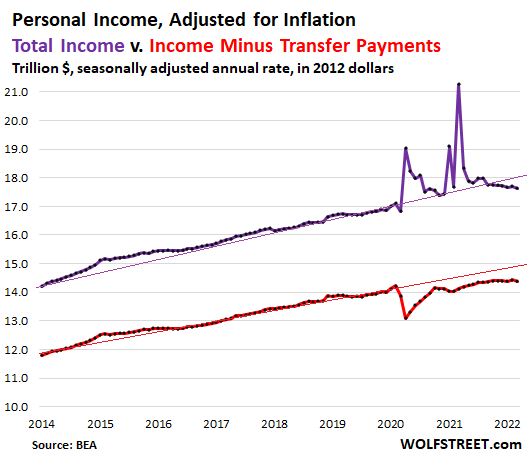
Real spending rose.
Total consumer spending on goods and services, adjusted for inflation, ticked up 0.2% in March from February, to a new record and was up 2.3% from stimulus-miracle March last year:
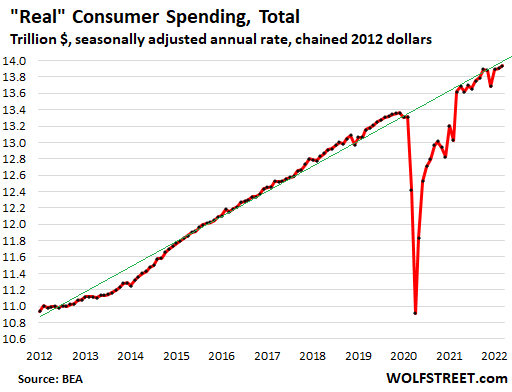
Real spending on services jumped.
Inflation-adjusted spending on services – air fares, rental cars, theater tickets, theme parks, cruises, healthcare, housing, education, haircuts, repairs, etc. – jumped by 0.6% in March, and by 6.3% year-over-year. Over the past two months, it just barely regained the levels of three years ago and remains below pre-pandemic trend. But as you can tell, it’s coming back:
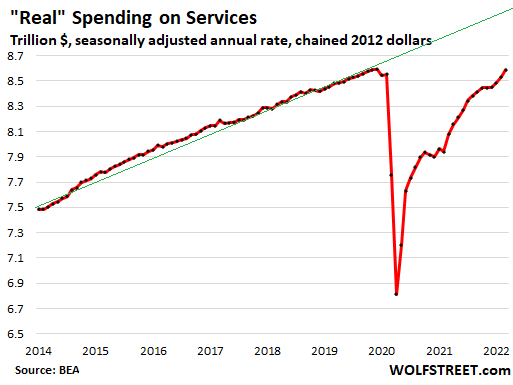
Spending on services in March accounted for 61.6% of total consumer spending, down from 64.3% pre-Covid, which shows that services still have a long way to go in their recovery, as goods continue to fade in the spending scheme.
And the increase in real spending on services in March and recent months is what has been driving the increase of total spending, overpowering the decline in spending on goods.
Real spending on goods continued to fall.
Spending on nondurable goods – mostly food, fuel, and household supplies – adjusted for inflation, fell by 0.3% for the month and by 0.8% from a year ago. During the pandemic, amid working from home, spending on nondurable goods had shifted to the household from company venues, and that massive surge in spending is just now unwinding a tiny little bit, and remains at nose-bleed levels, 13% higher than in March 2019:
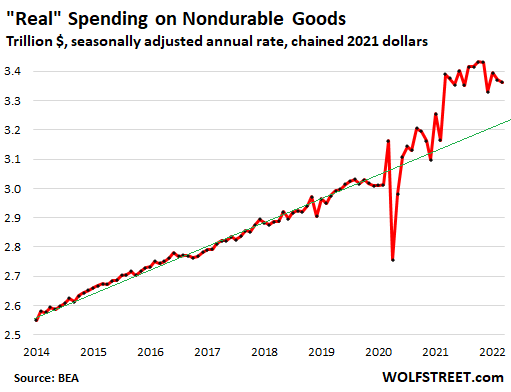
Spending on durable goods, adjusted for inflation dropped 0.9% in March, and 10.7% from stimulus-miracle March last year. But it remains at nosebleed levels, up 24% from March 2019. This is still a huge amount that consumers are spending on durable goods (adjusted for inflation) and is still a large contributor to the shortages in all kinds of things.
But that stimulus-miracle spike is getting unwound step by step, and it looks like an uneven regression toward the mean:
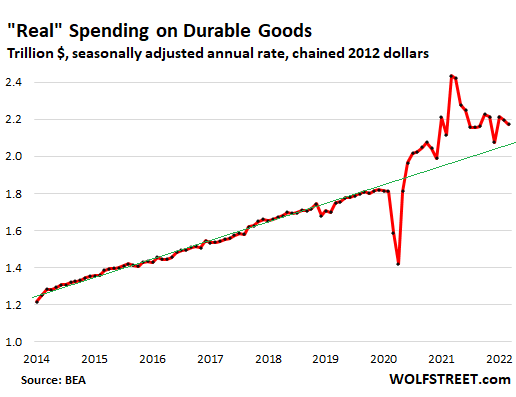
Enjoy reading WOLF STREET and want to support it? You can donate. I appreciate it immensely. Click on the mug to find out how:
![]()


The Dow (DJIA 30) had an amazingly fun day and closed down 937 points after having been very briefly down more than 1,000 points minutes before the close. As to money in the US economy there is far too little of it to effectively support an economy of the size of the US, but far too many little people have way too much money which is the core of the serious problem with rising prices and wages and that needs to be corrected without delay.
called TRICKLE UP theory
works EVERY TIME
What a mess, eh? And add to the above the apparent valuations of houses in our hood that are 4 TIMES what they were just 7 years ago, and the mess becomes a monster…
Will the good doctor be Dr. Frankenstein and continue to ”experiment” as has been done hugely since about 2008???
OR, will we get Dr. Kildare, etc., and cure the patient once and for ever and STOP all this very clearly NONSENSE???
Interesting times indeed with these kinds of charts, for which I certainly appreciate THE Wolf!
Nope, we are doing negative rates next time.
andy,
The Fed won’t do negative rates because banks hate them because banks make money on the spread and they need a steep yield curve. And the 12 regional Federal Reserve Banks are owned by the banks, and they represent the banks. So look at the bank stocks in Europe and Japan over the past 20 years, and how they’ve gotten totally crushed and reman by a huge margin below their peaks a long time ago, and then compare them to US bank stocks. You will see why the Fed will never do negative rates. People who say that the Fed will do NIRP don’t understand what NIRP does to banks, and they don’t understand the Fed, and they don’t understand who owns the 12 regional FRBs.
ie SO THIEVES one and all
I watched Dr Kildare…..and after an immense amount of continuing Biology study, I’m beginning to consider it sponsored content. Medical knowledge is far from that absolute.
“There are no laws in biology, only gadgets.” -Dr Crick
….yeah, the double helix, X-Ray crystallography, photograph 51 guy….the woman who’s team took it after many many tries, never got a bit of Nobel credit, but belated “sorta apologies” for that continue to roll in.
Paraphrasing George C. Scott as Patton: I’m not going to win this long struggle by spending for my country. I’m going to win it by getting the other avid consumer to spend for my country. Enjoy springtime, all!
My way is pretty constrained in spending but very nicely limited in expenses. Each to his own.
I find that sitting on liquid assets is very comfortable. I even like the color.
So, I get two emails back to back. One is notification of this article — spending shifting from goods to services. The other was a notification that my payment was received for season tickets to the symphony. Go figure.
Am enjoying the MN Orchestra @ intermission now, on my HD FM tuner live from Orchestra Hall. Simply superb. Gemma New is guest conductor. Fung ‘Aqua’ & Barber Symphony #1 and soon, Brahms Piano Concerto #1.
The new preamp & amp sound great! That’s good use of discretionary spending!
Charts look eerily similar to Elvis body weight charts when he was yo-yo dieting.Up,down,up again…
Then he died at the advanced age of 42 and was buried in triple-wide coffin.
Looks like every attempt to restrain gov/personal spending & reduce debt backfires and causes spending to soar even more.
Elvis was buried in a coffin identical to the one his mother Gladys was buried in.
Casket not coffin. Caskets are rectangular. Coffins are eight-sided, e. g, what Americans think of as a cowboy coffin. Retired funeral director says, “Back to regular programing.” Thank you.
Today I learned, thank you!
Amazing the kind of stuff you learn in the WOLF STREET comments. People who don’t read them have no idea what they’re missing.
For sure! Ya never know who will be in those boots on the ground comments. No, thank YOU.
Guess cowboy coffin saved wood, kinda like a mummy bag saves mat’l and weight?
Did you see the body?
I guess 99.99% of the population watched his state funeral in 1977.And many newspaper articles mentioned his 350lbs body weight at the time of death.187 lb gain since age of 32.
I am Elvis fan myself. Photos of Elvis in uniform serving in Germany inspired many of us to enlist.But his 12,000 calories per day hamburger diet is a precautionary tale.
J/K Brent. I’m an Elvis fan too.
Many of us enlisted.
Some of us were stationed in Germany.
But NONE of us enlisted could afford to rent a luxury apt and live off base.
Moral of the story:
One may imitate his idols but up to a point – limits being imposed by the budgetary constraints 😀
I’ll gladly pay you Tuesday for a hamburger today.
Wimpy
Dad kept the radar systems on the planes during the Berlin airlift in working order & got six years at University out the service. A win win, eh?
I got an engineering degree and an MBA paid for by the G.I. Bill for just keeping my finger on the trigger of a very large nuclear missile for 4 years.
Brent-some habits, psychologically akin to addictive drugs, are very hard to break once engaged in for a length of time…(or perhaps it’s just equine sense and reentering a burning barn…).
may we all find a better day.
Random observation/thoughts.
Lots of analysis saying how services (subs to software or media streaming etc) are booming at places like Apple, Microsoft etc.
In the past you’d buy MS Office, or buy a backup HDD, or buy films on DVD.
Today you just rent it all month on month and never own anything.
Is this also a long-term trend from goods to services?
Could there be a reversal or slow down on the cards given the renting solutions, despite appearances, usually being more profitable for the retailer, than value for money for the buyer?
Like anything rented, there can be a sudden price adjustment.
The subscription model involves getting the customer’s “lock-in” by having put lots of time/data/network capital into the particular product. The longer you use something, the stronger the lock-in: cost of switching.
I love my legacy software/hardware that not only does not demand more cash from me, it doesn’t spy on me either, or impose annoying worthless “upgrades.”
In the heyday of cars, a term was “planned obsolescence.” It is a core feature of capitalism: a forced march of creative-destructive churning, of “progress.”
The latest “whatever” is always being churned, but the enthusiasm and signalling of the fanboy is always as if it was something new, or better, or mattered.
You will own nothing and be happy.
I will own terabyte SSDDs and a video capture card and be happy.
Don’t forget the big dogs in the game are going to rent software upgrades. That way you don’t have to buy new phones anymore. Just look up Apples new pitch.
Interesting point but probably more important to keep in mind that medical care (20% of GDP…20%!!!) is considered a “service” as is home construction, I believe.
Those are two enormous and enormously inflated components of “services” that people don’t think of.
So if you overpay 3x for your new house and 5x for your MRI, spending on services goes up, but I don’t think the country is better off for it.
Look at home price stability over the last 20 yrs and the “heckuva job, Brownie” the health care industrial complex did with the million fatality pandemic.
“Spending” per se is not an indicator of progress.
> So if you overpay 3x for your new house and 5x for your MRI, spending on services goes up, but I don’t think the country is better off for it.
Indeed, both are massive misallocation of resources that I proudly don’t participate in thanks to working remotely.
Spending on durables = reverting to mean.
Spending on services= reverting to mean.
S&P = reverting to mean.
Home prices = reverting to mean.
Trying to reconcile the “services will come back” notion with the unmistakeable fact that the Stock Market is being cruelest to the Services-heavy sectors:
Year to Date:
Communication Services: -24.58%
Consumer Discretionary: -20.57%
Info Tech: -19.72%
Financials: -12.71%
Industrials: -11.46%
Real Estate: -9.91%
Health Care: -9.85%
Materials: -5.15%
Utilities: -0.42%
Consumer Staples: 0.50%
Energy: +36.65%
Communications (think Google, Facebook, Cellular and Cable), Financials, and HealthCare are all services-heavy.
Consumer Discretionary (think Amazon) is also more services-heavy.
InfoTech (Apple, Microsoft…) I’m not as sure about. Some hardware, some services…
Consumer Staples (think Walmart), Materials and Energy are goods-heavy. (Utilities might technically be classified as services, but in reality it is goods-intensive to produce and deliver energy and water.)
Market’s behaving as though the goods economy is going to retain the upper hand.
See above as to MedSpend and Construction being considered “services” – those sectors haven’t faced the same well-deserved cratering that tech and cyclicals have.
My guess is that enough sectors are getting far enough off their highs for the Fed to start thinking about peeing its pants again and at least pause the interest rates hikes. Once some sectors are off 30%, then I’m more certain the Fed would “pause”.
Real world inflation may not be enough under control to do so, but the Fed has a 20 year history of stupidity/cowardice.
Dow weekly log : 2018 high to Feb 2020 high to today low.
It’s disturbing to see how the economy, and especially the financial markets, have become increasingly dependent on government & central bank support.
When stimulus checks, tax cuts, ZIRP, QE, etc. are unleashed, the economy booms. Once the money printer is turned off, markets sell off & the talking heads forecast recession coming.
The often-used analogy of a drug addict dependent on ever-higher doses of stimulants to feel “normal” is accurate.
Is there anything that could be done to break this destructive cycle?
Jackson Y: “When stimulus checks, tax cuts, ZIRP, QE, etc. are unleashed, the economy booms”
Since then a lot of businesses went belly up, I have to drive only a few minutes to lose count of the empty shops. That’s a weird way of “booming”, unless the “booming” is of the destructive kind. Nothing is booming except prices, quality and selection are both going down. Official stats mean nothing, inflation is always seriously under-reported so the various “real increases” come from underestimating inflation.
High stock market valuations aren’t a sign of a good economy, they’re a sign of a Fed-driven casino gambling.
“Is there anything that could be done to break this destructive cycle?”
Yes, a massive deflationary economic depression to remove decades of economic distortions. Of course, I doubt the country can survive in its current form through it but doesn’t change anything.
What you are describing is the fake economy and fake “growth”. Reduce the federal deficit as a proportion of GDP back to pre-2008 levels and most “growth” over the last 13+ years disappears.
Take away QE since 2008 with it and the country would have been in a recession or depression most or all of the time.
It’s fake prosperity, it’s not going to last and when it ends, there is going to be serious political and social “blowback” as living standards decline noticeably and crash for large segments of the population.
Even with this economic and monetary fakery, “real” median household income and net worth have essentially flatlined this century.
Income and wealth inequality are not the entire reason or even most of it either, as distributing it more equally would have created raging inflation much earlier since the productive capacity does not exist to accommodate spending most of this fake prosperity.
The majority of Americans are destined to become poorer or a lot poorer over the indefinite future.
While American ingenuity is still a thing in certain sectors, a huge percentage of our population can’t sustain themselves in today’s economy, and will always require handouts. That’s the problem with destroying manufacturing and going to a financialized service economy.
So was the plan just to make the US a bigger version of the UK?
> When stimulus checks, tax cuts, ZIRP, QE, etc. are unleashed, the economy booms. Once the money printer is turned off, markets sell off & the talking heads forecast recession coming.
They are just paving the path to UBI, which I will likely get to see implemented.
Nothing can be done politically to break the cycle. The only thing that breaks the cycle is when it no longer works, which we’re rapidly approaching.
Governments can’t create wealth, or sustain lifestyles. The sad truth is that the productive capacity of our economy isn’t nearly enough to provide all 320 million people the middle class lifestyle they feel they deserve, so the only way to bridge the gap is 1) to tax people who do have income and redistribute it, which is politically unpopular, 2) to borrow the money and hand it out, which leads to an ever increasing deficit and higher debt service, or 3) to print the money and hand it out.
Our leaders chose option 3, and the negative effects are now being felt. There is no free lunch.
Couple of facts relevant to your comments. Governments are there not to fail, something the private market does every 10 years. Capitalism was grown with public funds and the appropriation of public lands to insiders. NASA, and R&D government funding in science and pharma, basically created what we had of productive investment. Mariana Mazzucato in ‘The Entrepreneurial State.’ Since Reagan said the government was the problem investment ended and we quickly slid down into the crapper. Now we’re loaded up with fantasists, called ‘libertarians’ who think we can have a nation without a national government. Circa the 1781 Articles of Confederation. Bums
Man, Economy, and State: A treatise on economic principles 1962 – Murray Rothbard
What’s with these crazy markets? One day up 400-600 next day down 400-800; It is like we have whole new set of investors each day; Are they nuts who does the selling?
The sellers end up with less shares for the same stock than they started with in this crazy market. The winner is whomever has the most shares when you are out for good. Right?
Computer algorithms are doing 85% of the stock transactions . The machines will take over eventually. You will have nothing and be happy. It’s all been planned.
Most of the moves aren’t that large. 400 points is about 1% on the Dow which is not even worth mentioning.
Daily volatility in the US seems to be a lot lower than the other markets I check on any regular basis.
Someone (SoCalBeachDude?) thanked at the end of yesterday, PPT for having ‘rescued’ from red to Green by the end of mkt hours. And then bad news on earnings of AMZN. INTC++ poured in. Meta zoomed and every one thought back to the bullishride.
Alas. Without FED there is no mkt of any sort. If Fed had stopped backstopping mkts., fundamentals start erupting, as today. I had a feeling yesterday’s rip-roaring rally was a BEAR trap. So I bought more puts and added more to my existing positions. Having sizable cash on the sidelines is a blessing.
Today the whole sectors of S&P collapsing including agriculture related stocks/ETFs. Only natural gas weathered a bit better.
AS I am writing, with so much volatility, this mkt for traders’ only. Those retain investors who are using options as a tool. will fare better than others but have to live with firece backlash. Hence hedges on the long side is always a must. I have survived more than 2 bears since ’82. This is no different except now fundamentals are decidedly against recovering economy and the mkts. B/c of leverage and almost records of debt in both public and private, GFC will look practice run! I hope I am wrong!
Bottom line: Without Fed, there is no mkt and the Bears will take over gradually, with lower of the highs and lower of the lows!
The only actual difference between traders, speculators and “investors” is the holding period. All of them are just buying and selling pieces of paper.
Augustus
It makes absolutelyt NO difference in a secular ( or protacted crash) BEAR MKT.
Only traders’ with ‘know how’ to Option trading’ can mitigate most of the loss. Learning Option trading ( takes years to understand, digest the pros & cons and use it wisely) is the best tool out there for retail investors, like you and me!
One has to undergo through a BEAR mkt where your guts will challenge your belives. This was a ‘surreal’ BULL’ started and nurtured by Fed since ’09 (Started in 2000- Greenspan), after declaring death sentence on the previous, good ole fashioned, American genuineMarket Capitalsm in the March of ’09!
B/w I used an conventional investor basing on the fundamentals but slowly switched over to TRADING using OPTION tools since 2003!
The coming BEAR mkt will be a ‘life time bear mkt’ for most of the YOUNG investors who came after ’09!
Legend investor – Jimmy Rogers
SPX : Mar19 high to Apr 18 low = X
Today low is 2X from Mar 19 high.
“There is still a huge amount of money floating around out there.”
It’s all leverage. It creates a lot of jobs, spending and GDP growth on the upside. Winds those back on the downside.
We’ve seen 40 years of leverage increase due to interest rates coming down. Nobody’s really had to pay off a debt because it could be rolled over into cheaper and cheaper payments. Zirp ends that party. We are about to find out how much of that spending was from zombie companies/jobs that cannot exist in a higher interest world. Perhaps.
This used to be a country that could survive and thrive with 8% 10 yr rates.
Now it flatlines if rates get near 3% (see Fall 2018 and now).
That is a pretty good measure of how crippled the US economy has become – about 40% as healthy in the 90’s.
Never seen this before — CNN (eww) Business has today’s market numbers in GRAY. Not red, GRAY.
Mind control?!
Fake news?!
It’s a gray area…..
🤣
Didn’t you notice CNN removing its Covid Death Counter once Biden was in office?
The only entity that got more pre-Biden CNN air time than the Death Clock, was Michael Avenatti, who made a hammock in Cuomo’s colon for a number of months.
Having never watched CNN (don’t have a TV at home) except in hotels in foreign countries back when I was traveling a lot, I totally missed all this drama about CNN, regretfully :-]
Yes, I noticed. My mother needs fear in her life so she watches CNN, FoxNews wasn’t providing enough.
I use CNN Business for the markets because it’s the easiest one to quickly scan.
Wasn’t CNN vehemently anti-war when GWB was in office? Now they’re ready to stand by their man Biden.
David Zaslav is CEO and President of Warner Bros. Discovery. This is the entity that now owns CNN. He has run Discovery since 2006. Discovery hit the Fortune 500, with him at the helm, in 2014.
The man has Polish & Ukrainian Jewish family heritage. Grew up in Brooklyn and got a JD at Boston University School of Law in 1985.
One should look at who owns the company and who is the ultimate decision maker. Ain’t that right Wolf?
I owned ‘Dan the TicketMan’. But Dad owned Trigen Seed LLC. I’m just a son of a breeder. Wheat, that is.
Your taking points don’t make any sense. Did you accidentally mix them up?
The US military is not fighting in any wars right now.
Apple, you make no sense. Too much MSNBC for you (I’ve read your comments here before).
Margrite is obviously a slow learner and cas127 didn’t help things.
March 2022 U.S. car production volume spiked upward (Trading Economics).
Stock market goes up and down like a yo-yo.
Mister Market does not suffer from manic-depression. He really rather enjoys it.
For now.
There is a brand new drug just now out and advertised on TV (forgot name, but it has a happy sound to it) that cures BOTH “Type1” and “Type 2” bipolar problems….a damned smart drug!
Perhaps it could be administered to Mr Market if it’s chemical formula was loaded into a trading algo machine?
“Perhaps it could be administered to Mr Market if it’s chemical formula was loaded into a trading algo machine?”
It’s worth a try, but nothing’s going to help much unless we can get The Fed to stop juicing up Mr. Market. Margin debt isn’t a Class 1 narcotic so lenders can’t be sent up on drug charges.
I think that advertising has so conditioned the American mind that our DNA has changed. Why else would we simply believe a politician without checking the facts? Or why else would we buy the least fuel efficient auto without considering the cost of fuel? Or have a 5 BR house but no kids? With my Prius I save so much fuel $ that I can rent a pickup every other weekend and still breakeven compared to that F150 I used to own. But I haven’t rented one in over a year. I guess I looked “cool” in my Pickup. Ya that’s it, I overpaid to look cool. I feel stupid. Thanks Wolfe, nice article as usual.
+3.
Thrift and thoughtfulness were American virtues until Edward Bernays came along.
Thrift is stupid during times of high inflation. Most people aren’t that stupid. Curiously, by the measures of modern economics, Wiemar’s economy was “booming” during the hyperinflation years… but then the real booming started…
“Thrift is stupid during times of high inflation.”
Thrift is the avoidance of spending foolishly.
If you depend on people spending their money foolishly you should find yourself an honest line of work.
unamused: “Thrift is the avoidance of spending foolishly. ”
That’s untrue – thrift is preference for saving over spending. It’s quite amusing to try to define “spending foolishly” when inflation is taking your unspent savings away and giving it to others. That is quite certainly “saving foolishly”.
I REALLY hope people look him up like I did last time you mentioned him. Just the Wikipedia article will do. IIRC, he made bacon and eggs the all American breakfast singlehandedly. His services were probably NOT cheap at all, but he sure delivered.
TK/una/TB-would posit that thrift&thoughtfulness were generationally kicked out of the ‘Murican psyche back in the good ol’ stagflationary days of the ’70’s-’80’s….
may we all find a better day.
Got out of majority of my puts (kept Tesla). I think the market is due for a rebound. Fun fact: sold one amazon put for $5300 two days ago, that today was sold for $9500. Sold another two AMZN puts just this morning for around 5K each. Later today those same puts sold for 7K. Crazy times.
Rebound or not, junk bonds are setting new lows and looking like they may just go of a cliff.
This is only Episode 1. Come December, things are going to be brutally dark. Thinking Dot Com Crash + Housing Bust…
I remember doing some research awhile ago and for past 100 years or so was best to exit market when volatility picked up and stay out until volatility died down. I think I used volatility of past 21 trading days but don’t remember the cutoffs.
One way I conceptualize this is that there is a lot of highly risk averse money that hates volatile markets and gets out when volatility picks up and stays out for quite a while until volatility comes back down, which can take many months.
But now you can go long volatility, as I am. At today’s close, I’m up 25 percent on that, on securities bought over the last month or so. And unlike options, they don’t expire, they fall to some (over recent years) pretty steady, not-too-low level and bump along in a narrow range for a long spell until they awaken and go wild. This can come and go quickly though!
It can take a lot of patience, but it is not your grand-daddy’s buy-and-hold. If grand-daddy bought into stocks awhile ago, he might be OK basis-wise, if unhappy, but his bond fund is bleeding.
I’m wondering if there is another layer of panic and a leg down for stocks. All this leverage, it will soon be discovered, DOES have a price, in very “REAL” terms, especially if adjustable debt (as credit card debt is). Gut-churning terms.
Think of inflation as a tax on the poor, the cash oriented, and the savers.
Volatility at a top is a sign of instability and a warning to get out. The wheels are coming off the wagon
What is happening is you all looking unkempt during your red-eye flight to bumblefuk nowhere vacation
Obey. Consume. Buy. Submit. This Is Your God 💵
Schadenfreude for the poor.